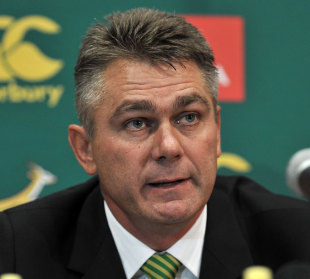|
Comment
Four years too late
Stephen Nell
February 6, 2012

Heyneke Meyer was unveiled as the Springboks' new coach last month
© Getty Images
Enlarge
Four years too late. That is probably the sentiment of the majority of South African rugby supporters following the appointment of Heyneke Meyer as Springbok coach. Meyer had been the hot favourite to succeed Jake White after the 2007 Rugby World Cup, but Peter de Villiers sneaked in ahead of him on a boardroom vote where politics triumphed over sound judgement. De Villiers' credentials - even if he deserves credit for notable achievements in 2009 - did not begin to measure up to that of Meyer, who had masterminded the Bulls' first Super Rugby triumph in 2007. Meyer's legacy also paved the way for successor Frans Ludeke to win the Super Rugby tournament in 2009 and 2010. Never before in the professional era had there been such an obvious shoo-in for the job. He is nevertheless facing some tough challenges, the obvious being a rebuilding of the Springbok team following retirements and departures of players to France, England and Japan. Meyer's approach is a pragmatic one. He will travel to the aforementioned countries and gauge the hunger of the likes of scrum-half Fourie du Preez, utility back Frans Steyn, centre Jaque Fourie and prop Gurthrö Steenkamp to continue their Springbok careers. Du Preez will be a particularly interesting case. Meyer predicted a number of years ago that he would still captain South Africa and, provided he's no longer feeling the effects of a shoulder injury that may have been the reason for his disappointing World Cup campaign, may gazump Schalk Burger for the leadership role. Whatever Meyer decides on the captaincy front will initially be a short-term measure while he susses out his team dynamics and long-term approach. Meyer's main problem is that he will only get his players on the Monday prior to the first Test against England on June 9 in Durban. There will be planning sessions prior to that, but the reality is that it will be rugby suicide to immediately change much in terms of personnel and approach. One of the reasons for South Africa's failure in the World Cup may be a falling between chairs. They had been defensively hopeless in 2010 before the entry of the tactically astute Rassie Erasmus and defensive expert Jacques Nienaber tightened them up. However, the intervention ultimately proved too late and the blueprint had not completely manifested itself by the time the Boks bowed out in controversial manner to Australia. What can one expect from Meyer? The first and most important thing will be playing to South Africa's traditional strengths, which will mean direct rugby based on a sound set-piece and physical dominance. The Bulls were often criticised for their predictable approach, but they were ultimately among the leading try-scorers as their physicality paved the way for assaults on the try-line. Do not expect Meyer to deviate much from this. It is what South Africa are good at and playing uncomplicated rugby makes the most sense for a team whose players will still be involved in Super Rugby on the weekend before they play England. Meyer's appointment will provide an obvious incentive for South Africa's players in Super Rugby. Even accounting for an emphasis on continuity, there are gaps that need to be filled.
There may well be a sword hanging over the heads of the Stormers, Bulls, Sharks, Cheetahs and Lions as they may potentially be faced with the spectre of having to avoid relegation. The South African Rugby Union (SARU) has committed itself to the inclusion of the Eastern Cape-based Kings in Super Rugby in 2013, meaning that the country is faced with the challenge of fitting six teams into five spots. It may be that there is an alternative solution, with SARU having been invited by New Zealand to present a proposal for a new structure for Super Rugby. This could involve a sixth South African team. There is a strong school of thought that Super Rugby simply involves playing too many games, which extract an obvious physical toll on players and as a result may hasten the exodus to the northern hemisphere. However, it remains to be seen whether this is a realistic scenario as the existing structure and number of games have been sold to broadcasters. None of the South African teams are without challenges that could spiral out of control and make them vulnerable to the worst-case scenario of relegation. The Stormers have been rocked by the departure of Erasmus as Western Province's director of coaching, the Bulls are in a transitional rebuilding phase, the Sharks have a few obvious weaknesses in midfield and at lock, the Cheetahs will often find themselves in a position where they have to rebuild following a raid on their playing resources, and the Lions are struggling financially. If SARU are unable to resolve the issue through a structural change in the tournament format, they will have to work out a mechanism for relegation. This could either involve a tendering process or a straight relegation scenario. Either way, it's likely to enter in a major catfight and the potential for legal wrangles. South Africa's rugby issues remain a major challenge, even if the best man for the job has finally been appointed as Springbok coach. © ESPN Sports Media Ltd.
| |||||||||||||||
Live Sports
Communication error please reload the page.
-
Football
-
Cricket
-
Rugby
-
- Days
- Hrs
- Mins
- Secs
F1 - Abu Dhabi GP
Abu Dhabi Grand Prix December 11-131. Max Verstappen ()
2. Valtteri Bottas (Mercedes)
3. Lewis Hamilton (Mercedes)
4. Alexander Albon ()
5. Lando Norris ()
6. Carlos Sainz Jr ()
-
ESPNOtherLive >>
Snooker - China Open
Tennis - Miami Open

